Do Hawks Eat Chipmunks?
Hawks are dangerous with their hunting features. On the other hand, Chipmunks are most of the time the target of predatory species. But what is the specific relationship between a hawk and a chipmunk? Do hawks eat chipmunks?
Hawks sometimes hunt and feed on chipmunks depending on various factors. It may not be a common part of their food habit, but they will certainly attack a chipmunk given a chance.
If you want to know more about what factors are in force while determining whether a hawk will attack a chipmunk or not, make sure to read the entire article.
Do Hawks Hunt Chipmunks?
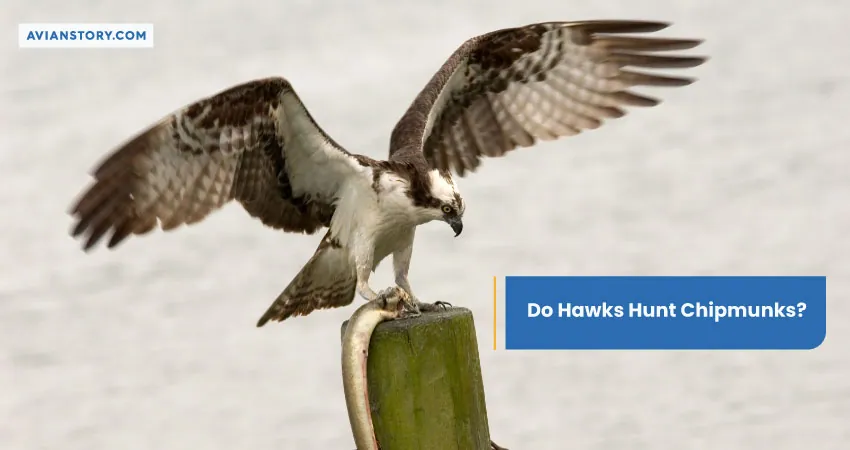
It’s difficult to find a strict list of the animals hawks will attack. Hawks are one of the most vicious carnivorous birds in the wild, and they practically attack anything they come across when they’re hungry. As for preference, they usually stick to rodents, rabbits, and other small mammals, reptiles like snakes, small birds, etc.
This preference can also vary depending on the hawk species, the habitat, and the availability of food. So, in simple terms, hawks will occasionally hunt chipmunks when there are fewer animals available that they prefer to hunt.
What Type Of Hawk Eats Chipmunks?
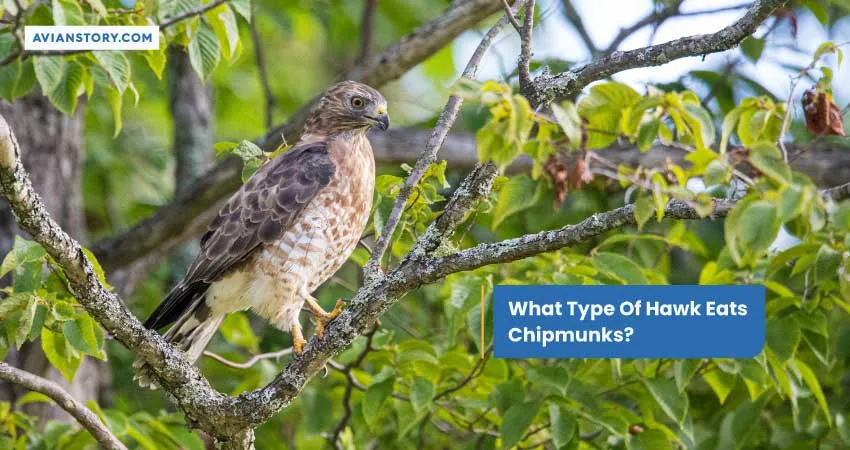
There are a variety of hawks available throughout the world. Some hawks, like the red-tailed hawks, prefer larger animals compared to chipmunks. However, some species, like Cooper’s hawks, are known to hunt chipmunks more than others.
No matter what type of hawk it is, chipmunks are in danger of being hunted by the hawk. Hawks have been reported to hunt larger animals like deer, cats, and dogs. So, hunting chipmunks is not an impossible thing for them.
The question is whether they prefer hunting chipmunks or not. In that case, the answer would be no. When other food sources are available that fit their preference more closely, they will not go out of their way to hunt a chipmunk.
So, whether a hawk will hunt and eat a chipmunk or not depends more on food availability than the type of hawk.
Can Hawks Pick Up Chipmunks?
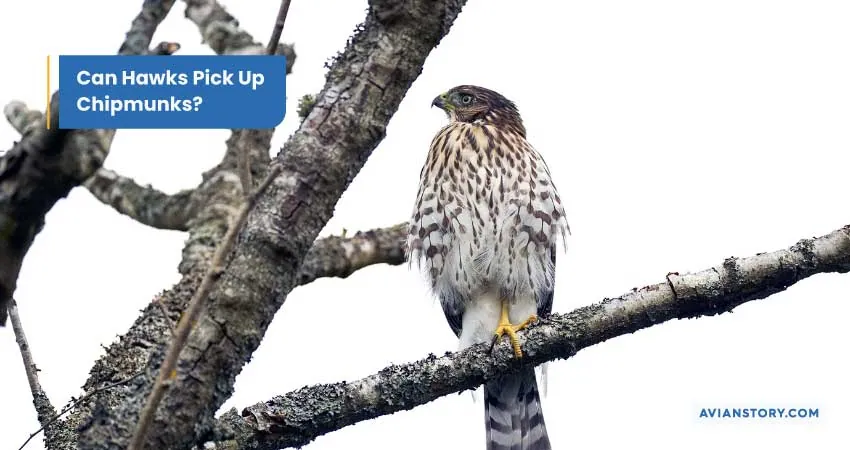
A hawk can easily pick up chipmunks when they are hunting. Their hunting skills are excellent, which, combined with their sharp beak and strong talons, become unstoppable. So, even though hawks prefer going for animals like rabbits, they can efficiently hunt and pick chipmunks when they want.
Usually, hawks wait on tree branches for chipmunks to run. When the chipmunk becomes visible to the eye, the hawk swoops down to grab it and then feast on it.
Do Hawks Eat Dead Chipmunks?
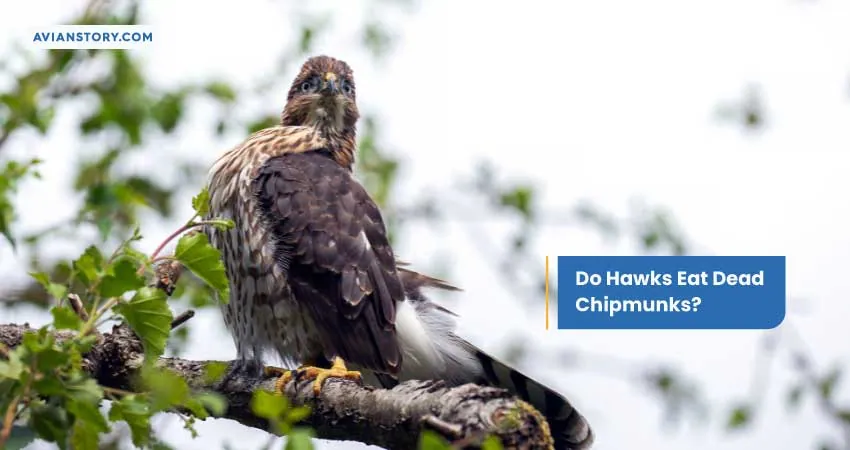
Carnivorous animals do not stay limited to eating living animals. The hawks are no different, either. Sometimes, you may witness hawks enjoying dead animals in the wild, which can also be a dead chipmunk. So, why do they feed on dead chipmunks?
While hawks usually prefer to hunt their living prey, sometimes nature isn’t very kind to the hawks. In winter, there are fewer living animals running in the wild, making it extremely difficult for hawks to get a proper meal.
That’s when they rely on dead animals, including dead chipmunks. The dead chipmunks can be a victim of roadkill, or another animal may have left it there. The hawk will certainly take advantage of the ready meal available at its disposal.
You hawks that haven’t developed advanced hunting skills yet may also feed on dead chipmunks when they find one. It may not be the preferred way, but it’s certainly easier.
What Are Other Predators Of Chipmunks?
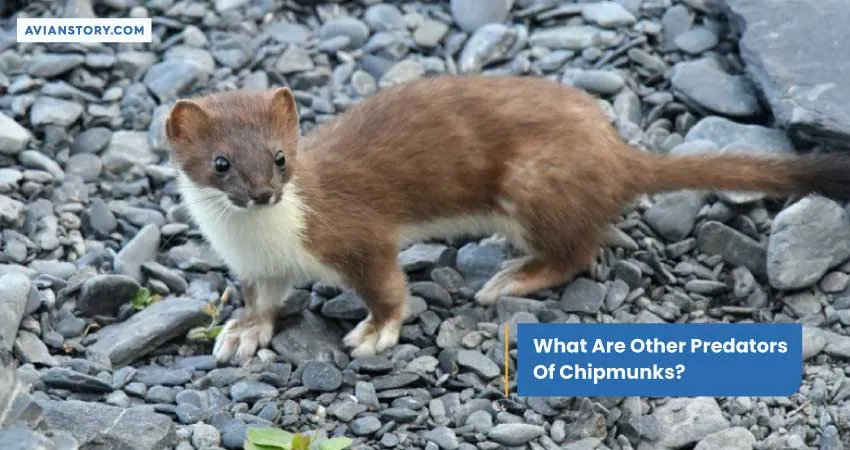
As adorable as chipmunks are, it doesn’t help with their survival in the wild. Hawks aren’t the only predator after chipmunks. There are other animals chasing chipmunks because of their size and weakness. Let’s take a look at them.
- Long-tailed weasels
- Ermines
- Red foxes
- Lynxes
- Owls
- Coyotes
- Bobcats
- Raccoons
- Fishers
- Snakes
- Weasels
- Red squirrels
How Do Chipmunks Defend Themselves?
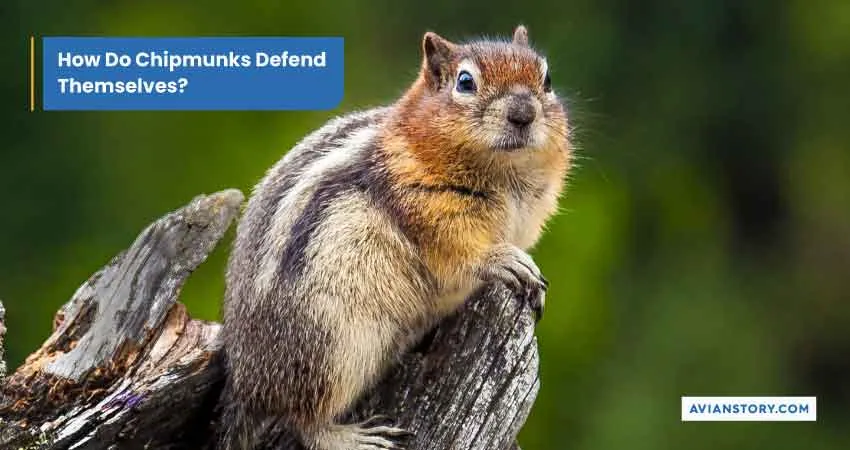
With so many predators lurking around for a meal in the wild, the shot a chipmunk has at a long life is very low. Nonetheless, this little creature has some excellent tricks to survive the wild. Some are natural, and some are adaptive.
For instance, the stripes chipmunks have on their backs are a natural form of survival tool. They can easily hide in plain sight because of their stripes on the back. However, their survival tactics do not depend entirely on those.
Chipmunks are very fast animals. They can quickly run and get inside small spaces inside trees to hide. Another interesting tactic they use to survive in the wild is to use a certain type of communication.
As a social animal, a chipmunk will alert others of the presence of a predator. There are two types of sounds they make when they locate a predator in the wild. If it’s an avian predator, chipmunks will generate a low-pitch noise to alert others. On the other hand, if they locate the predator on the ground, they will generate a high-pitch noise to alert others.
When attacked by aviary predators like hawks, a chipmunk will put up a fight whenever possible. It uses its sharp claws and teeth to fight off the hawk. In case it gets a chance, the speed helps with running fast and hiding in encased spaces. It’s not that uncommon for a chipmunk to escape the attack of predators.
Wrap Up
Hawks keep changing their diets based on what food is available near them at the time. This not only increases their chance of survival but also makes them a powerful carnivorous species. So, the answer to do hawks eat chipmunks is yes. They do feast on chipmunks given a chance.
Even with all the survival skills, chipmunks often become the victim of not only hawks but also other predatory species. That’s why chipmunks usually don’t live very long. Nonetheless, many times, the chipmunks may be strong enough to fight off hawks and other predators regardless of their small size.
